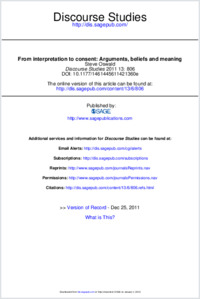From interpretation to consent: Arguments, beliefs and meaning
BLE-BLL
- Oswald, Steve ORCID University of Fribourg
- 2011
Published in:
- Discourse Studies. - SAGE Publications. - 2011, vol. 13, no. 6, p. 806-814
Argumentation
Beliefs
Cognitive pragmatics
Constraint
Critical discourse analysis
Fallacies
Information-selection
Interpretation
Meaning
English
This article addresses the relationship between understanding and believing from the cognitive perspective of information-processing. I promote, within the scope of the Critical Discourse Analysis agenda, the relevance of an account of belief-fixation sustained by a combination of argumentative and cognitive insights. To this end, I first argue that discursive strategies fulfilling legitimization purposes, such as evidentials (see Hart, this issue), tap into the same cognitive mechanisms as (both sound and fallacious) arguments. I then proceed to examine the idea that the most effective arguments are the ones that manage to obscure or make irrelevant counter-evidence and propose, from a cognitive pragmatic perspective, a formulation of rhetorical effectiveness as a constraint on information-selection taking place at the interpretation stage and decisively influencing the evaluation stage responsible for belief-fixation.
- Faculty
- Faculté des lettres et des sciences humaines
- Department
- Département d'anglais
- Language
-
- English
- Classification
- Language, linguistics
- License
-
Rights reserved
- Open access status
- green
- Identifiers
-
- DOI 10.1177/1461445611421360e
- ISSN 1461-4456
- Persistent URL
- https://folia.unifr.ch/unifr/documents/323883
Statistics
Document views: 77
File downloads:
- 2011-oswald-discoursestudies136: 218
